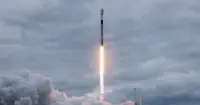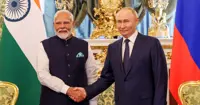China commits to reducing trade surplus in 2007
06 Mar 2007
Beijing: China has assured its trading partners that it would strive to bring down its growing trade surplus in 2007 to ensure the sustained development of its economy and foreign trade.
Speaking at the fifth session of the tenth National People''s Congress (NPC) currently underway in Beijing, Chinese prime minister Wen Jiabao, told the assembled parliamentarians, "We must optimise the mix of imports and exports, change the pattern of China''s foreign trade growth and strive to reduce our excessively large trade surplus."
China, which had recorded a 10.7-per cent growth in 2006, has set a reduced target of 8 per cent GDP growth in 2007. During 2006 the country''s exports grew by 33 per cent to $86.62 billion.
Despite a 1.2-percentage point decline in the growth of its exports and a 2.4- percentage rise in imports, China recorded a trade surplus in 2006 to $177.5 billion — a 74-per cent growth from the previous year''s record of $101.9 billion.
In January 2007, China''s monthly trade surplus rose to $15.88 billion, a growth of 67.3 per cent from January 2006.
The US and EU have been sharply critical of China''s rising trade surpluses, saying the country keeps its currency artificially low against the dollar to keep its exports cheap.
With India, its 10th largest trading partner, China had a trade surplus of $4.11 billion on a trade volume of $25.05 in 2006, up from India''s $843 million surplus in 2005, despite India having imposed the maximum number of anti-dumping duties on Chinese goods.
China acknowledges that its ballooning trade surplus is fraught with dangers for its sustained economic growth.
Commerce minister Bo Xilai, a deputy at the NPC, had said last month that "cutting the huge trade surplus" was "the priority task for 2007" for his ministry.
Bo warned that unless steps were taken to rectify the situation, China''s trade surplus would expand to $300 billion and could turn "an economic problem into a political one."
"The yawning surplus with the US and the EU has strained China''s foreign trade environment, triggering more frequent trade frictions," he said, while simultaneously calling for a "rational and objective analysis" of the factors responsible for the trade surplus.
Bo said, "We need to consider more than one factor when counting trade surplus. However, some countries have limited understanding or have exaggerated one side or another of the constitution of China''s trade surplus, as a result, they can''t get a real trade picture in China."
.webp)






























